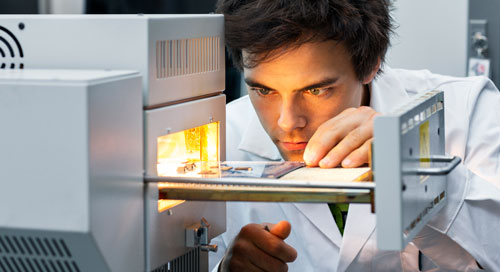Computing
Computing

The research objective of the Computing (COMP) unit is to develop and analyze fundamental technologies that enable the performance-sensitive computer systems and applications of the future.
The research activities of the Computing unit range from basic research on unconventional computation and theoretical algorithms to application-oriented research in the areas of high-performance computing, bioinformatics, computer vision, graphics, and search.
The Computing unit covers all main abstraction levels of computer systems and consists of experts in computer architecture, system software, parallel computing, algorithms, and visual computing. This makes the group ideally positioned for both in-depth studies in established fields and cross-disciplinary efforts spanning multiple abstraction levels.
Publications
We aim to disseminate our research results to the scientific community through scientific publications. We publish at the highest international level.
Projects
Our research activity is organised around research projects. Currently we contribute to the following projects.
EU projects
- Detecting Document Fraud and Identity on the Fly (D4FLY), 2019-2022. | Theoharis Theoharis
- Cultural Heritage Analysis for New Generations (CHANGE), 2019-2022. | Theoharis Theoharis
- Towards Employing Compilers for Thermal Management and Optimal Data Placement in Hybrid Caches, H2020 MSCA-IF, 2021-2022.
- Harnessing the Emergent Properties of Nanomagnet Ensembles for Massively Parallel Data Analysis, (SpinENGINE), H2020 FET-Open, 2020-2023. | Gunnar Tufte
- Boosting Widening Digital Innovation Hubs (BOWI), H2020 DT-ICT-01-2019, 2020-2023 | Magnus Själander
National centers
- NFR - SFI: Centre for Geophysical Forecasting (CGF), 2020-2028 | Anne Elster
National projects
- NFR: SPrINTER: Spin-based Intermittent Computer, 2022-2026
- NFR: TailorMade: Tailoring Server Processors to Application Characteristics for Sustainable Warehouse-Scale Computing, Young Research Talents, 2020-2025. | Rakesh Kumar
- NFR: Balancing Compute and Memory Accelerators with Analytical Modeling (BAMPAM), 2019-2023. | Magnus Jahre
- NFR: PorMIC: Computational Microscopy of Porous Materials, 2018-2023. | Anne C. Elster
- NFR: SOCRATES: Self-Organizing Computational substRATES, 2018-2022. | Gunnar Tufte
- VR: Leveraging Multi-Value Logic to Modulate Approximation in Future Nano Devices, 2016-2021. | Magnus Själander
Strategic research areas
- Digital Twins | Frank Lindseth
- Energy Efficient Computing Systems (EECS) | Magnus Själander
- NTNU Morphogenetic Engineering | Gunnar Tufte
Other projects
Partners
Research and business partners associated with our research group.
Research partners
- St.Olav's Hospital
- Sintef
- Democritus University of Thrace
- University of Houston
- University of Texas at Austin
- University of Cork
- Uppsala University
- Ghent University
- Florida State University
- MIT
- University of Houston
- Democritus University of Thrace
Industry collaborations
- AMD
- Arm
- ATMEL Norway
- Nordic Semiconductor
- Oracle
- Powel AS
- Schlumberger
- Valka AS
- Yahoo! Inc
- Intel
- Mode Sensors
- Sensor Innovation
- Q-Free
We have a long history of cooperation with industry partners.
Our master students have a skill set that results in them having little difficulty in getting employed in Trondheim, the rest of Norway, or abroad.
Infrastructure
Laboratories and teaching areas used by our researchers and students.
- Computer Architecture Lab | Gunnar Tufte
- EPIC cluster | Magnus Själander
- HPC Lab | Anne C. Elster
- Idun cluster | Magnus Själander
- Visual Computing Lab | Theoharis Theoharis
Education
We educate students within:
Master Project and Thesis Topics
- Computer Architecture (Magnus Jahre)
- Unconventional Computing (Gunnar Tufte)
- Visual Computing (Theoharis Theoharis)
- Algorithms and Data Structures (Srinivasa Satti)
- Extended Reality (Gabriel Kiss)
- Computer Architecture (Rakesh Kumar)
- High-Performance Computing (Anne Elster)
- Algorithms (Magnus Lie Hetland)
- Architecture & Compilers (Magnus Själander)
- Visual Computing (Frank Lindseth)
- Compilers (Stefano Cherubin)
- Edge Intelligence (Di Liu)
- High-Performance Computing (Jan Christian Meyer)

 COMP people
COMP people